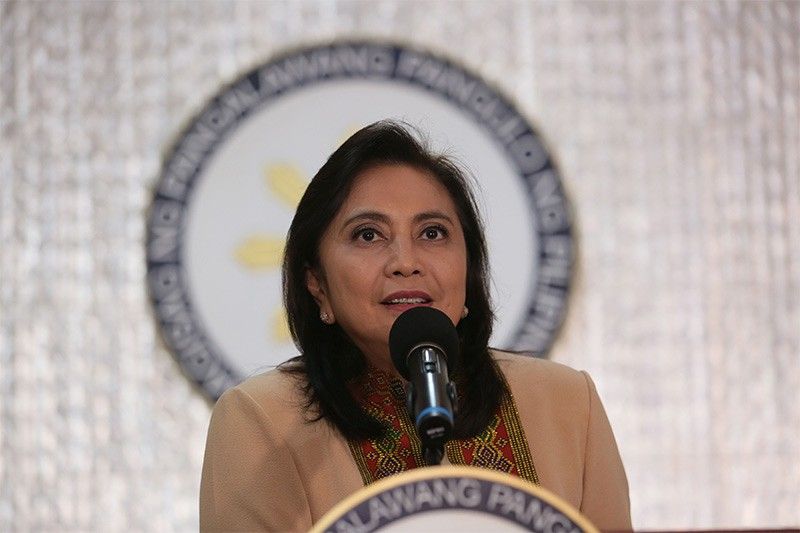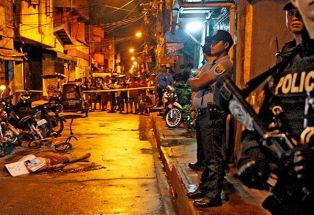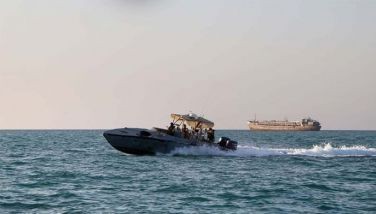Robredo is meeting with UN reps this week. Here's what the UN has said about drugs and 'drug wars'

MANILA, Philippines — On her first full week as co-chair of the Inter-Agency Committee on Anti-Illegal Drugs (ICAD), Vice President Leni Robredo will be meeting with officials from the United Nations and the United States government to share best practices in combating drugs.
READ: What role does the ICAD play in the war on drugs?
"On Monday, I will also meet the UN officers here in the Philippines. They have a lot of research and studies about best practices and lessons from other countries regarding the campaign against illegal drugs,” she explained in a mix of English and Tagalog.
That does not mean that she would invite international experts to look into the government's 'war on drugs,' saying on Friday that she thinks "it is only fair to the agencies involved that I talk to them directly about it before deciding what to do next."
RELATED: UN rights chief criticizes Duterte's drug war, calls for public health approach
Best practices
The UN General Assembly in April 2016 agreed to "recognize drug dependence as a complex, multifactorial health disorder characterized by a chronic and relapsing nature with social causes and consequences."
Clinching election victory off people's disenchantment with a perceived failure of law and order, President Rodrigo Duterte implemented the 'drug war' almost as soon as he became chief executive. And as early as his election, the message from the UN and members of the international community was clear: Killing, especially without due process, is not the answer.
"Allegations of drug-trafficking offenses should be judged in a court of law, [and] not by gunmen on the streets," UN rapporteurs Agnes Callamard and Dainius Puras said about the extrajudicial executions in August 2016, at which point more than 850 people had already been killed since Duterte's election in May.
The government has repeatedly stated that extrajudicial killings are not state policy and that "drug personalities" killed in law enforcement operations — 5,375 by March 31, the latest data released by the Philippine Drug Enforcement Agency — had violently resisted arrest.
United Nations High Commissioner for Human Rights Michelle Bachelet in June said that "even the officially confirmed number of 5,425 deaths would be a matter of most serious concern for any country."
The government later revised the numbers.
READ: "Revised drug war death toll is thousand less than previous figure"
Bachelet has also urged the Philippines to adopt a public health approach to the drug war to comply with international human rights standards.
"People who have fallen into the trap of drug reliance need help to rebuild their lives," Bachelet said in a speech.
"Drug policies should not be more of a threat to their lives than the drugs they are abusing."
What does the data say about illegal drugs?
But Duterte has consistently implied that drug addicts are long past the point of recovery.
In a 2016 speech, the chief executive said that sustained methamphetamine usage for a year or more would shrink the brain of a person, explicitly adding that “he is [therefore] no longer viable for rehabilitation.”
In a March 2019 paper entitled "What we have learned over the last ten years: A summary of knowledge acquired and produced by the UN system on drug-related matters," the UN said that "drug use is linked to a range of health, social and protective factors."
Among the main vulnerability factors they outline are growing up in marginalized, stigmatized and deprived communities, mental health and behavioral disorders, family neglect and abuse and poor attachment to school and the community.
The paper goes on to recommend: “Investing in prevention and control of drug use and drug use disorders [produces] significant returns: saved lives, prevented disabilities, healthier populations, improved workforce participation and productivity, and reduced criminal justice costs.”
Age has been noted as a factor as well.
According to a separate 2018 report on drugs among the youth also by the United Nations Office on Drugs and Crime, deaths resulting from drug use disorders among those aged 50 and older rose more than three times from 2000-2015 in the Western Pacific region, under which the Philippines is classified according to the World Health Organization (WHO).
UN documents share the same theme of harm reduction and long-term recovery and rehabilitation as the “clear solution” to combating drugs worldwide. Harm reduction is defined in the documents as the establishment of “a rights-based, public-health approach” to drug use that seeks to “reduce the health, social and economic harms of drug use to individuals, communities and societies.”
These initiatives can include but are not limited to drug dependence treatment and overdose prevention programs. Studies have shown that countries that take on this perspective towards drugs effectively “deliver broader social benefits by reducing pressure on health-care and criminal justice systems.”
Given this proposed approach, healthcare systems have been encouraged to assess their own approach to the drug problem as well. The Joint United Nations Programme on HIV/AIDS in April 2016 conducted a study on the links between health, human rights and drug users, and found that “despite the high disease burden and the availability of evidence-informed treatments, health systems rarely reach out to people who use drugs.”
Philippine data on rehabilitation
The government's anti-drug campaign includes rehabilitation, with the Dangerous Drugs Board reporting in October, that there were 54 treatment and rehabilitation facilities that reported to the Treatment and Rehabilitation Information System in 2018.
DDB said 5,447 admissions were recorded that year, 5,188 of which were new cases. Another 171 were relapsed cases while 88 sought treatment in an out-patient facility.
The policy-setting DDB said there was a 34.66-percent increase in admissions against figures in 2017.
"The continuous and relentless efforts of law enforcement and immediate response of local government units in the all-out campaign to eradicate the drug problem, assisting identified individuals with problems on drug use to avail treatment and rehabilitation programs, and the plea bargaining agreement which comprise almost 25% (24.89%) of the admissions, may have contributed to the increase," DDB also said.
According to admission data, most drug abusers who went into rehabilitation programs were around 32 years old and were male.
More than half were single and unemployed and 28.14% had high school level education. Most were also poor, with an average family income of P11,265.10 a month, and living in the cities.
They had been taking drugs for more than six years and commonly abused methamphetamine hydrochloride (shabu), marijuana, or contact cement.
Drug war ‘not a failure’
The challenge for Robredo came amid her call for the administration to recalibrate their approach towards dealing with the drug problem. At the same press conference where presidential spokesman Salvador Panelo clarified the terms of Duterte’s offer to Robredo, the mouthpiece was also careful to defend the results of the drug war.
He cited that police data from 2017 said that over 1.26 million drug personalities have turned themselves in, along with a figure from former police chief Oscar Albayalde, who said that 124 policemen were killed in the aforementioned buy-bust operations.
"There were millions of surrenderees [and] we have dismantled so many illegal drug factories," he said. "Number three, there have been rehabilitation centers where we place all those drug-addicted individuals."
He added, "If you cannot call that a success, I don't know what is."
READ: Duterte's offer for Leni not an admission that drug war failed — Panelo
But a 2019 booklet by the UNODC says that despite "heightened law enforcement measures" in the Philippines, likely referring to Duterte’s signature crackdown, "sources of methamphetamine trafficked from overseas into the country appear to have diversified."
Furthermore, the booklet cited Drug Abuse Information Network for Asia and the Pacific data on the drug problem in the Philippines that showed seizures of shabu went down from 2016 to 2018, from a high of 2,210.5 kg seized in the first year to just 785.8 kg in the latter.
During his campaign for the presidency, Duterte often promised voters that he would be able to eliminate the illegal drug problem within three to six months of his election. He later asked for a six-month extension to his self-imposed deadline, and later he again told reporters to “Give me another year.”
‘Drug czar’ post?
All this came as a result of Duterte’s offer to appoint Robredo as the “drug czar” for six months, an idea that some felt was unfair, considering the 'drug war' had already run for three years.
Such was the wording Panelo used in extending the bid to Robredo in a text message he showed to reporters. However, the title of drug czar does not exist as an official position anywhere in the Philippine government.
READ: What even is a ‘drug czar’?
And despite this initial proposal, what Robredo was instead given was the co-chair post for ICAD. Some officials took notice of this, saying the appointment was a political move and urging the vice president to decline the offer.
"Bakit biglang co-chair na lang? Takot ba sila na bigyan ng tunay na kapangyarihan si VP at baka masapawan sila o may tamaan?" Pangilinan called.
(Why is it suddenly co-chair instead? Are they scared to give her a real chance for fear that she might outdo them?)
Robredo's designation as co-chair of the ICAD is valid until the end of Duterte's term, according to a letter signed by Executive Secretary Salvador Medialdea.
READ: NewsLab: The War on Drugs
In June, the UN Human Rights Council—of which the Philippines is a member—voted 18-14-15 on a resolution calling for a "comprehensive" international review of the Philippine government's drug war. It was a resolution that the Philippines rejected.
"It cannot, in good conscience, abide by it," Foreign Affairs Secretary Teodoro Locsin Jr. said. “We will not accept a politically partisan and one-sided resolution so detached from the truth on the ground."
- Latest
- Trending


































